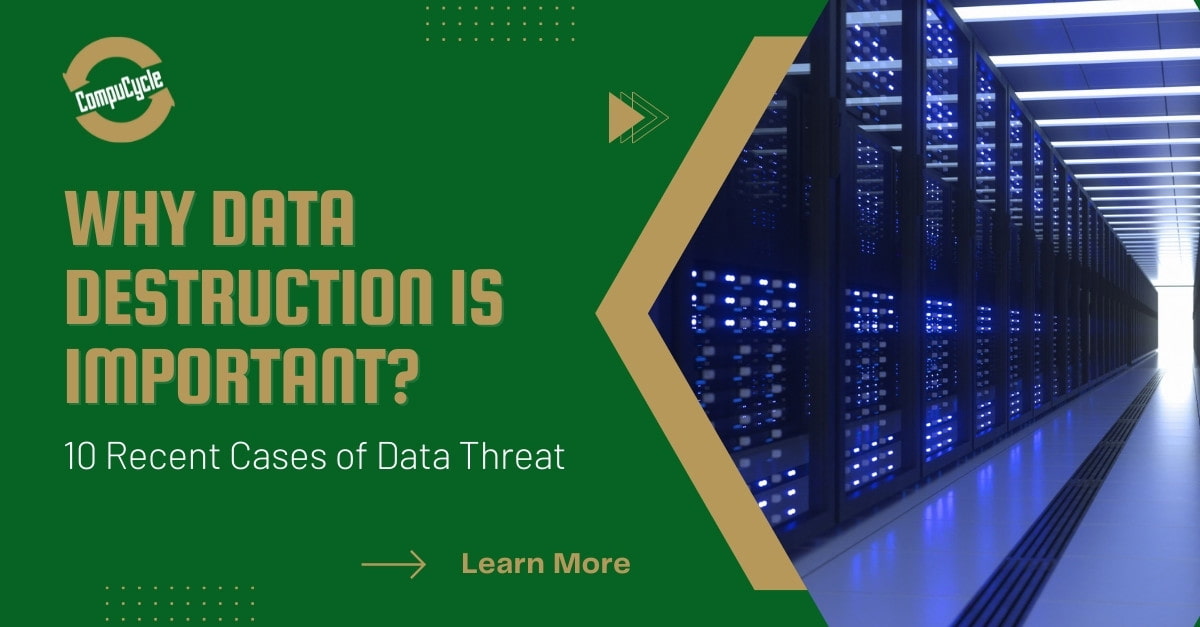How Robust Data Destruction Enhances Your Overall Cyber Security Measures
The Significance of Effective Information Devastation Practices in Safeguarding Sensitive Information and Ensuring Computer Safety And Security
In a period where information violations are significantly typical, the relevance of effective data destruction methods can not be overemphasized. Organizations face significant dangers when sensitive info is inadequately disposed of, potentially leading to unauthorized access and severe financial repercussions. Executing robust data destruction methods not only mitigates these risks but additionally straightens with lawful conformity demands, making sure that organizations support their credibility and foster client trust. The concern remains: what details approaches can be utilized to enhance these techniques, and just how can organizations effectively incorporate them into their total cybersecurity structure?
Comprehending Information Damage
Recognizing data devastation is essential in today's electronic landscape, where sensitive information can easily be endangered. Effective data devastation includes not just removing data yet guaranteeing that information is irretrievable via extensive techniques. This procedure is vital for companies that handle personal client info, intellectual home, or inner documents, as any breach can bring about severe financial and reputational repercussions.
Information devastation incorporates various techniques, including shredding physical media, degaussing magnetic storage space gadgets, and using software-based remedies that overwrite data multiple times. Each method serves a particular function and needs to straighten with the level of sensitivity of the details being disposed of. For example, physical damage is typically liked for difficult drives consisting of very personal information, while software application techniques could be sufficient for much less sensitive info.
Moreover, sticking to market requirements and policies, such as the General Data Defense Guideline (GDPR) or the Health And Wellness Insurance Coverage Portability and Accountability Act (HIPAA), is essential for conformity and to alleviate legal risks. Organizations has to establish a robust information damage policy, train staff members on ideal techniques, and consistently investigate their procedures to ensure that all delicate information is dealt with safely and effectively.
Threats of Inadequate Practices
Insufficient information damage practices subject organizations to significant dangers that can have far-reaching effects. When sensitive details is not correctly taken care of, it stays vulnerable to unapproved accessibility, which can cause information breaches and identification burglary. Such cases not only endanger the safety and security of people but additionally tarnish the organization's reputation, leading to a loss of consumer trust and prospective economic consequences.
In addition, governing compliance is progressively rigorous in numerous markets. Failure to follow information destruction guidelines can cause hefty fines and lawful activities versus organizations. These charges can divert and strain monetary sources focus from core business operations.
On top of that, the abuse of recurring data can bring about copyright burglary or company espionage, jeopardizing affordable advantages (data destruction). The impact of insufficient data damage prolongs past immediate economic losses; it can additionally cause lasting damages to brand name honesty and market position

Organizations need to acknowledge that information safety is not exclusively concerning stopping violations; it likewise includes the accountable management of data throughout its lifecycle. Neglecting effective data devastation methods can have tragic ramifications, highlighting the requirement for robust measures to minimize these threats.
Finest Practices for Data Destruction
Implementing reliable information damage practices is essential for guarding delicate info and maintaining conformity with regulative standards. Organizations should take on a multi-faceted technique to guarantee that information is irretrievable, consequently avoiding unauthorized accessibility and potential violations.
First, data should be classified based on level of sensitivity, enabling organizations to use suitable destruction techniques tailored to the degree of risk. For digital data, making use of software-based data-wiping tools that abide by market criteria can successfully overwrite existing data. Physical damage methods, such as shredding or degaussing, are critical for devices that save sensitive details, ensuring full eradication.
Developing a clear data retention policy is essential, detailing for how long different types of details ought to be preserved before damage. Normal audits of data storage space read the article systems are additionally required to recognize unneeded or outdated data requiring elimination.
Furthermore, training workers on the relevance of data damage and the certain methods to follow fosters a culture of safety within the organization. Preserving paperwork of information damage refines gives liability and sustains conformity with external laws and internal plans. By sticking to these ideal practices, companies can substantially mitigate the dangers connected with information direct exposure.
Legal and Conformity Considerations

Failing to abide by these guidelines can cause severe charges, consisting of considerable penalties and reputational damages. Organizations should carry out a durable information destruction policy that lines up with these lawful structures and provides clear guidelines on the appropriate techniques of information disposal, whether physical shredding or electronic cleaning.
Moreover, preserving paperwork of information devastation tasks is essential for demonstrating compliance during audits or evaluations. By focusing on lawful and conformity factors to consider, companies can boost their information protection posture and foster trust with clients and stakeholders, ultimately contributing to a more protected data management environment.
Benefits of Effective Data Destruction
Reliable information devastation methods prolong beyond simple compliance; they offer significant advantages to companies that prioritize them. you could check here By making certain that delicate info is irretrievably ruined, organizations reduce the risk of information violations and the prospective monetary repercussions related to them. This aggressive method not just safeguards against unauthorized access but likewise enhances the overall reliability of the company in the eyes of clients and stakeholders.
Applying durable data damage techniques, such as physical destruction of storage space gadgets or advanced information wiping strategies, contributes to the fortifying of an organization's cybersecurity posture. data destruction. It lowers the probability of copyright burglary and secures exclusive information, thus keeping an one-upmanship out there

Verdict
In conclusion, effective information destruction practices are important for safeguarding delicate info and enhancing total computer security. Inevitably, a dedication to robust information damage strategies cultivates a culture of responsibility, consequently strengthening a company's cybersecurity pose and maintaining client depend on.
